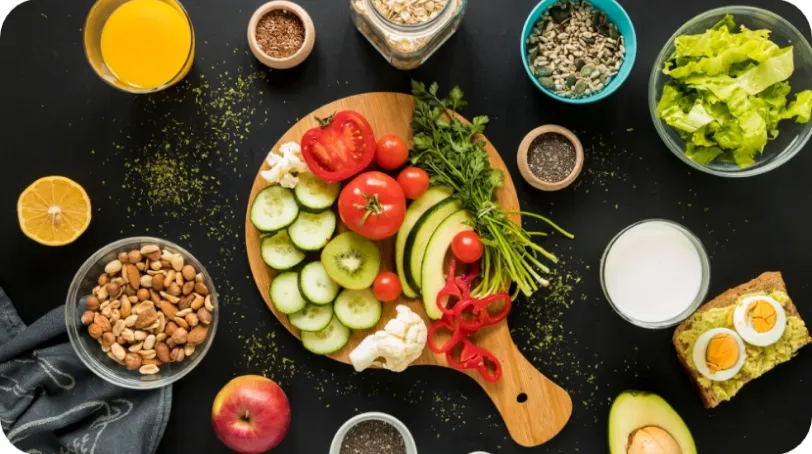What is Balanced Diet? – Benefits and its importance
Explore what a balanced diet is, its benefits, and why it’s important for your overall health. Learn how a well-rounded diet supports energy levels, immune function, and long-term wellness.
Explore what a balanced diet is, its benefits, and why it’s important for your overall health. Learn how a well-rounded diet supports energy levels, immune function, and long-term wellness.

Table of Contents
Think of your body as a well-oiled system, full of heavily built parts that function only through a fuel, named nutrients. Now, without this fuel, a machine will sputter; its performance may decline, and eventually, it may come to a gruelling stop. Our bodies may or may not respond to the lack of nutrients in a similar way. This is where the need to maintain a balanced diet comes in. Now, you might ponder what is a balanced diet and if maintaining it warrants a whole nine-yard commitment. Well, maybe.
In the fast-paced world that we live in, eating healthy doesn’t have to be all about restricted diets that can soon become a drag. Instead, try aiming for a well-structured balanced diet. Let’s venture further into the topic of its characteristics and the importance of a balanced diet in your daily life.
One of the most common needs to ensure a healthy lifestyle is a balanced diet. As per National Institute of Nutrition (NIN) and Indian Council of Medical Research (ICMR), a balanced diet is a nourishing wholesome diet which provides adequate proportions of essential nutrients from all food groups like Cereals & Millets; Pulses; Vegetables; Nuts, Oilseeds, & Fat; Green Leafy Vegetables; Fruits; Dairy; Roots & Tubers; Flesh Foods; Spices & Herbs. At least 5-7 food groups among these should be consumed on daily basis
Generally, a healthy diet must contain sources of protein, carbohydrates, healthy fats, vitamins & minerals. It is necessary to maintain good health & also include other components like dietary fibre, antioxidants and phytochemicals which bestow positive health benefits.
ICMR-NIN’s My Plate for the Day provides guidance to achieve a balanced diet.

A Balanced Diet should provide adequate Carbs, Protein & Fats for a healthy individual. Each of these nutrients have an important role to play as mentioned below:
| Food Group | Sedentary Adult Male consumption/day | Sedentary Adult Female consumption/day |
| Cereals & Millets | 260g | 190g |
| Pulses & Beans | 85g | 60g |
| Milk/Curd | 300ml | 300ml |
| Roots & Tubers | 100g | 100g |
| Green Leafy Vegetables | 100g | 100g |
| Other Vegetables | 200g | 200g |
| Fruits | 100g | 100g |
| Nuts | 40g | 30g |
| Fats (visible) | 30g | 25g |
If you want to consume a balanced diet, it is imperative for you to understand the important nutrients you need to intake as per the food groups mentioned below. Worry not, we have made this information easily available to you with the table below. It includes the Recommended Dietary Allowances (RDA) & Food Group Allowances which can help you craft a balanced meal for yourself.
| Nutrients | Sedentary Adult Male | Sedentary Adult Female |
| Protein (g/d) | 54 | 46 |
| Fibre (g/d) | 30 | 25 |
| Calcium (mg/d) | 1000 | 1000 |
| Iron (mg/d) | 19 | 29 |
| Iodine (mcg/d) | 140 | 140 |
| Vitamin B12 (mcg/d) | 2.2 | 2.2 |
| Vitamin D (IU/d) | 600 | 600 |
*RDA’s basis NIN-ICMR, 2020 (selected few for example)
*Suggested food groups for a balanced diet to meet daily nutrient requirements, Dietary Guidelines for Indians, 2024
Also Read: What is Muscle mass And How Do You Maintain it.
Hence, understanding the significance of a balanced diet is integral for anyone aiming to live a healthy and fulfilling life. So, what is a balanced diet? It is more than quick fixes; it is an organised meal plan that includes all the prime food groups. This process may help in a balanced approach towards foods as a source of nourishment and growth, ensuring that your body is ready for daily activities. So, start your wellness and health journey and reap the benefits of a balanced diet.